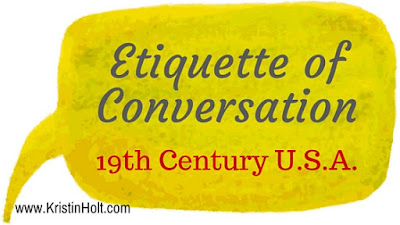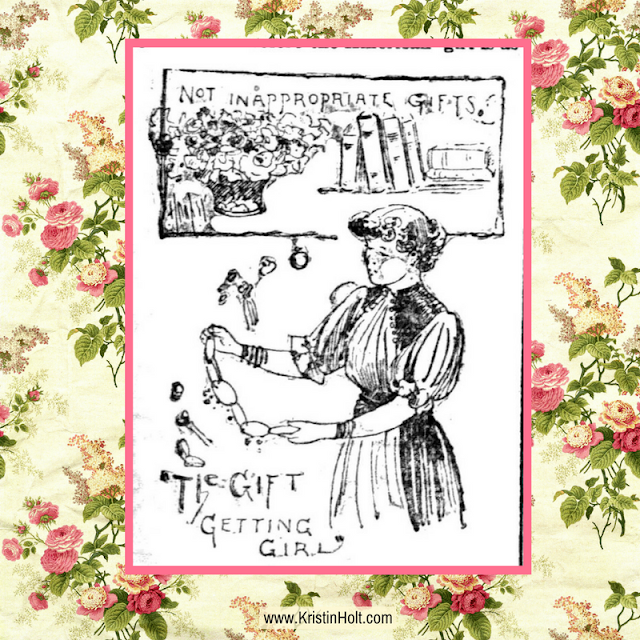by Kristin Holt
USA Today Bestselling Author
I enjoy researching the day-to-day practices of courting in the 19th Century United States, together with the selection of a bride (or groom), and the role parents played in the process. After all, aren’t the most enjoyable historical romances those set against an accurate backdrop?
I came across a gem of an article that both made me chuckle (things have changed!) and a little sad. I can easily draw comparisons in today’s world (or at least my own when I was dating, many years ago)...
Originally published in the Democrat and Chronicle of Rochester, New York on July 7, 1889. I took great care to ensure I preserved the historic spelling, punctuation (or lack thereof), and formatting. Note: bolded passages are for emphasis, and were not original to the 1889 publication.
HOW TO GET A HUSBAND
----------------------------
Mrs. Wilcox Discusses Some Nice Points Arising Out of Courtship.
----------------------------
“AN EXPERT OPINION”
----------------------------
Should Young Ladies Receive Gifts From Young Men to Whom They Are Not Under Engagement of Marriage – Young Ladies and Chaperons.
----------------------------
Written for the DEMOCRAT AND CHRONICLE.
NEW YORK, July 6, 1889.---Should a young lady receive gifts from a young man whose attentions she desires to encourage?
When the subject was suggested to me for discussion I do not think the propounder of it realized that it was as distinctly “American” as the stars and stripes or the emblematic eagle.
In no other country under the sun could such a question seriously arise, because in no other country is the young person allowed such latitude of conduct as in America.
Of course, our most careful mothers in conventional circles are supposed to rear their daughters in a very proper manner regarding their associations with the opposite sex.
But no matter how wisely the American girl is chaperoned in public places, she is allowed and takes her small liberties of tete a tetes, and promenades with gentleman friends which she could not take in any other land upon the globe.
Aside from this limited circle of ultra conventional people which each large city contains, we have hundreds of thousands of beautiful and refined girls dwelling in our lesser cities and country places who comprise the “best society” of their respective town, and who walk, drive and dance about with their numerous admirers quite according to their own ideas of propriety and pleasure and with no interference from chaperones.
There recently appeared in a French society journal the statement that it was customary for entire strangers to call upon American young ladies whom they were desirous of meeting; that these young ladies received them cordially, and entertained them pleasantly by conversation until midnight, frequently, when if the mother chanced to pass the door and glance in the daughter would laughingly remark, “I do believe ma is getting curious.”
This most remarkable statement regarding our customs will be a surprise to all good American mothers, I am sure, and yet too many American mothers do not exhibit enough curiosity concerning the young men who call upon their daughters. If Mollie and Sallie are fast friends, Mollie is allowed to take her gentlemen friends to call upon Sallie. And if for several weeks thereafter Sallie goes walking, rowing and driving with one of these gentlemen, her mother is quite satisfied with the explanation that it is “one of Mollie’s friends.”
Mollie is a neighbor’s daughter, and a very nice girl, indeed, and Sallie’s mother rests content with that knowledge, and is glad the young folks are enjoying themselves.
While I assert boldly, knowing thoroughly my premises, that Mollie’s mother may be found by the hundreds, if not by the thousands, in all the smaller towns of the United States, yet the vigilant and watchful mother exists, too. Not long ago I heard a gentleman, who had been remarkably successful as a ladies’ man, recount how on three separate occasions he was confronted by dignified mothers and asked to “state his intentions” before continuing his calls upon their daughters. As the gentleman in question did not marry any one of the three daughters in question this method would hardly seem a successful one for mothers to pursue. But a thoroughly dignified lady would never have permitted herself to be sufficiently compromised to need this question asked. However much liberty of action may be granted her there is an inborn pride in the true woman which compels her to defend herself from meaningless or compromising attentions. Although the chaperoning system is rapidly gaining ground with us, yet it will require another hundred years at least before the American girl is as carefully hedged about with conventionalities as her foreign sisters are. Whether she will be the better for it in the long run, is a subject open to discussion. I myself do not believe the girls who have been carefully guarded from the society of gentlemen until their marriage, make the best wives and mothers. I wish some statistic lover would study up on this subject and find what percentage of divorces are from the governess guarded and rigorously chaperoned young women, and what from the independently educated class who have mixed freely with the opposite sex in school and in society. Of one thing I feel sure: that the charming ease of manner, the grace of action and the quickness of repartee for which our girls are admired the world over, will decrease and disappear whenever she is as completely barricaded by conventionalities as is the English and French maiden.
And yet there are many of our free born daughters of independence who need to restrict themselves in their idea of liberty.
I have known a vast number of seemingly modest and reputable girls to slyly boast of their ability to obtain presents from young men, and who sported jewels and articles of personal adornment obtained from numerous admirers and worn by them with evident pride. A young lady in one of the lesser Western towns distinguished herself by entering into a limited engagement of marriage with seven admirers, from each of which she obtained a ring. These rings she retained after the rupture of the engagements, and on her final marriage to another admirer she displayed a unique bracelet, which, she smilingly informed her friends, was made out of the engagement rings of her discarded lovers.
That this style of young woman exists in America to the extent sufficient to form a type, is proven, I think, by the old song with the catchy air which is played by street bands and sung at theaters and of which the following verse is a sample:
“Although I don’t intend to wed,
To settle down in life,
I’ve promised nearly forty men
That I will be their wife.
And for a kiss they give to me
Full many a costly thing,
But, on my word, I don’t intend
To wear the wedding ring.”
Surely in no other country could such a song be written of respectable society, or sung to a respectable audience. Yet it appeared a few years ago in a magazine which is devoted to giving pleasure to the home circle and which falls into the hands of young girls.
I saw the other day in a society paper the following verses which evidently relate to the same type of girl:
I gave Babette a jeweled ring,
(Babette is not her name—no matter.)
It was a garish gaudy thing;
But gifts like these can favor bring;
They argue for you and they flatter.
I purchased it and kissed each gem;
Methought in fashion mildly pensive;
“A happier fate awaits for them
Than resting in the diadem
Of any king with realms extensive.”
What did the damsel I adore?
I think her conduct heartless, very.
She had it tested; what is more,
She took it to a jewelry store
To ask its value monetary.
It seems to me the right ideas on these subjects do not have to be learned from chaperones and customs. I cannot imagine a true minded young woman in any station in life receiving any gift more expensive than a book, or a basket of flowers from a gentleman not tied to her by bonds of blood or betrothal.
I wish young girls could know the indefinable but certain lessening of respect which every man feels for one who invites, or gives gifts freely. Of course men will offer gifts, when they dare do so. They know that with the vain and ambitious girl who lacks pride, “That gifts like these can favor bring. They argue for him and they flatter”—but every favor a woman accepts from a man who has not asked her to be his wife, places her just so much farther from his honest respect.
One of the happiest wives I know to-day, first attracted the attention of her husband by a conspicuous absence of jewelry in her attire. She was a self-supporting orphan, and he was a well to do man of the world, who had come much in contact with gift-loving young women.
Knowing the propensity of his sex to buy the favor of pretty and unprotected girls, he felt an unusual interest in one who had withstood their bribes, and to-day the happy wife wears jewels consecrated by love in payment for her years of good sense.
However much men may cater to and pursue the gift-getting girl, they distrust her principles and the coarse minded are quick to imagine her more unwomanly than she really is; for I am not writing of the vicious adventuress, but of a type of pleasure-loving, selfish, but chaste American girls who guards her honor zealously, while she sells her smiles and preferences and exhibits her “presents” as trophies of victories.
A wise girl shows no preferences. So long as her heart and hand are free she will do well to treat all those gentlemen admitted to her society with an air of well bred ease, which at once gives them to understand that she expects nothing of them but courtesy, and which not infrequently piques them into a stronger feeling. A great beauty of my acquaintance made herself unpopular and neglected by an air of insolent indifference amounting to rudeness. This is never good form, never pays, unless one wishes to wound and antagonize. I have known to young ladies to lose possible husbands by trying to monopolize the attentions of young men whom they had met. A young man complained to me last summer at the sea shore at this propensity of young ladies. “I knew only one young lady here when I came,” he said, “and she will not introduce me to any others. I want to dance at the hops, but cannot of course unless I know the ladies.” I have found it invariable true that the girls who introduce their gentlemen friends freely and readily are themselves the most sought after and popular. Nothing makes a man so desirous of going as the feeling that he is being hindered from going. Nothing makes him so ready to return as a willingness on your part to let him go.
One of the greatest mistakes a young lady can make is to expect her gentleman friends to entertain and amuse her constantly, while she poses as a beautiful and admired object, from whom nothing is expected. Men tire quickly of this sort of women. They are willing to exert themselves for a time, but they invariably demand to be amused finally. I have often seen plain girls, who knew how to amuse and entertain, walk off with the most desirable lovers of the season, while beauties sat as reserved wall flowers, “willing to be entertained.” After marriage, if not before, you will find my words true; so learn to amuse, for it is of more value in keeping a lover than all the fine dresses, all the fashionable accomplishments and all the beauty in the world.
ELLA WHEELER WILCOX.
What do you think of Mrs. Wilcox’s advice?
What comparisons can you draw to today’s dating practices? What contemporary behaviors are like the “Gift-getting Girl?”
Today’s readers see nothing wrong with a single woman accepting gifts from a man she’s dating. What practices, held as normal today, do you anticipate future generations will see as odd? stifling? absurd?
Please scroll down and comment! We’d love to hear your thoughts.
I’ve written several blog articles that touch on similar subjects. Perhaps some of these will catch your eye. Simply click on the image (or the link in the caption).
 |
| How to Attract Men, April 6, 1894 |
 |
| Errors of Modern Courtship (1881) |
 |
| Modern Lovers Have New Ways (1902) |
 |
| Definition of Love Making was Rated G in the 19th Century |
 |
| The Proper and Safe Way to Terminate a Victorian American Courtship |
 |
| Etiquette of Conversation, 19th Century U.S.A. |
 |
| Street Car Etiquette (1889) |
 |
| Courting in Public Parks, May 28, 1893 |
 |
| The Spinster book: 1901 (And Men Are Like Cats...) |
 |
| Truth in Courtship, 1865 |
 |
| Victorian America: Women Responsible for Domestic Happiness, 1860 |
 |
| Victorian America: Women Control Happiness at Home (1876) |
 |
| Old Fashioned Notions about Marriageable Women |
Kristin Holt, USA Today Bestselling Author, writes Sweet Victorian Romance set in the American West. She writes frequent articles about the nineteenth century American West--every subject of possible interest to readers and amateur historians. She contributes monthly to Sweet Americana Sweethearts.
Kristin is a wife and mom (without grandchildren), a reader, a skilled seamstress, a not-so-skilled housekeeper, a self-taught bread baker and knitter, a Registered Nurse, and former Territory Manager of Weight Watchers. Writing is much more fun than working in medicine or the corporate world. Kristin spends so much time exploring the nineteenth century, she's grateful to live in the twenty-first--with climate control, antibiotics, and successful medical surgeries. After all, she's a surgical veteran, having experienced eight or nine and lived to tell about it.
Website | Email | Newsletter | BookBub| Twitter | Pinterest | g+| Facebook Profile | Facebook Fan Page | Goodreads | Amazon
Copyright © 2018 Kristin Holt LC







How fascinating. While American women appear to have much freedom, the author also seems to present a cautionary tale. Like you, I love newspaper article like this. Thank you for sharing it. Doris
ReplyDeleteThank you, Doris.
DeleteThis comment has been removed by a blog administrator.
ReplyDelete